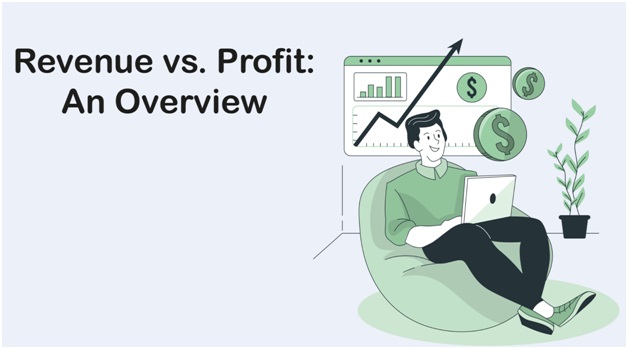Whether you classify yourself as an investor or a business owner, your business broadly revolves around making the maximum profits out of it. Even if you are engaged in a start-up business, it is mandatory to understand the principles of your business, accounting, and analytics. To upkeep the overall health of a business, it’s vital to measure the business performance.
A beginner may get confused in understanding the major differences between the business related terms. While channelizing your business goals, you should get to know what is what. There are terms that relate closely and are often used interchangeably. However, the two terms namely revenue and profit are however different and collected in a different way. Here Financeshed will explain the difference between of revenue and profit

When it comes to drawing a line of difference between revenue and profit, it’s equally important to calculate the two terms. Every sized business involves some form of loss and gains. While trading, you need to underline the difference between revenue and profit.
A Broad Guideline on Revenue VS Profit
While it’s entirely possible to have revenues without profits, it’s not possible to have profits without revenues. To give a clear understanding to business owners, profit is left after paying all the bills and expenses. While on the other hand, revenue is termed as the money a business that makes by selling its main goods and services.
While analyzing the performance of a company, the variations of profit are marked on the income statement. Though generating revenue bears a net loss at the same time.
You may question why does revenue and profit of a company matter? To assess the overall growth of a company and the best way to direct is syncing a coordinated move between profit and revenue. While dealing with the trading patterns, investors need to figure out the quantity demanded at a particular price. Indeed, while purchasing goods, we delve our insights on the printed prices marked on the products. This is the best determinant in capturing the profit of a company.
Let’s check out what does it mean by gross revenue vs gross profit.
When the business investors take a note of the company’s profit, they don’t refer to the gross or the operating profit but rather the net income. It is possible for every company to generate revenue and it gets listed on the top of the income statement. Never make a mistake in bringing a clear understanding that income cannot be considered as the revenue because for accounting the growth of a company, additional income streams and various types of expenses earned from the subsidiary company should be kept separately.
Sometimes, investors give little importance to the profits. In terms of analyzing the performance of a company, there are variations of profit on the income statement. In order to determine directly, the gross profit is considered as the revenue deducted from the cost of goods. In fact, these are the direct costs for the production of goods sold in a company. On a narrower basis, this brings the inclusion of the cost of materials required to prepare the cost of products along with indicating the labor costs used to produce them.
Which Creates More Value?
Again, on the discussion of difference between revenue vs profit, traders often question that can profit be higher than revenue? When a company receives the income statement, the revenue is in the top line while the profit is in the bottom line. Why is profit lower than revenue? It is because the liabilities and expenses are deducted.
Do the Two Terms Imply the Same Meaning?
The debate goes on revenue vs profit. Here, you have to know, do the two terms-revenue and sales imply the same meaning? Yes, the revenue is commonly referred to as the sales. To be precise, revenue is any income generated by a company and the expenses are subtracted.
Is Revenue More Significant compared to Profits?
It is necessary to understand which one is more important and impactful for an organization. So, often, investors ask whether is it wise to choose profit or revenue? In short, both are valued but it helps in gauging the accurate position of a company’s financial status. For calculating profits of a company, the financial experts opine to consider the liabilities and expenses such as payroll.
The Bottom Line
To sum up the debate concerning the revenue vs profit, it is to notify that these are two closely related terms directing the growth of a company. When some business professionals start finalizing their investment plans, they should understand and analyze the thin lines of difference between the revenue and the profit. When the income is made without considering the investments, it’s termed as the revenue. On the contrary, it’s equally important to bring the coverage of all the expenses a company has incurred. These expenses include taxes, wages, debts, and other expenses.











